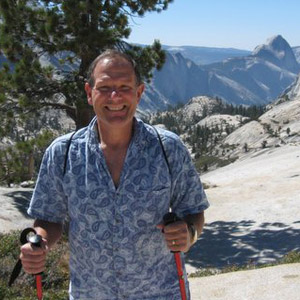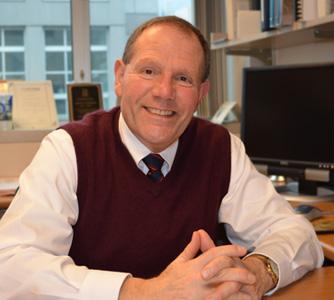How long have you been at the UW?
I've been on the faculty for 36 ½ years. I was an undergrad and also went to grad school here. I'm a real Husky, given my history. I bleed purple and gold.
What drew you to the financial/economic side of health care?
Takeaways from the health insurance marketplace
I was thinking about medical school. I told my adviser I was less interested in science and more interested in people and management and economics. She said, "Do you know about health management and health administration?" I said no, but I assumed that people had to run hospitals. We had a new program here that started in 1970. I was in the first class that received MHA degrees in 1973.
How long have you been on the Exchange Board, and how did you get appointed?
More than two years. I was nominated by the state House Democratic Caucus and appointed by the governor. I've been teaching about health insurance and corporate finance for 35 years. So this was an exciting opportunity for me to put my action where my lectures are.
What's it been like so far?
It's been a great ride. We were really more of a policy-making, strategic direction-setting board the first two years. Now we've switched to being more of an operational, enterprise board. It's got the challenges of government, and the challenges of the private sector.

Doug Conrad likes to hike
What's the overall mission?
Affordability of health insurance is absolutely a key goal. Equity is another key principle. We look at everything through the lens of whether the choices and recommendations made will reduce disparities in health insurance and disparities in health care.
Remind us why the Affordable Care Act is so important.
The root problem we're trying to address is that 15 percent of the US population does not have health insurance. In Washington state, that's roughly 1 million people.
How would you rate the success of the Exchange so far?
All things considered, we've done well, but not as well as we'd hoped in terms of enrollment. [Nearly 250,000 people in Washington state had signed up for Medicare and private insurance by Jan. 1.] I think the prospects for the coming year are quite good, particularly as the message gets out. The coverage that was offered was reasonably competitive, with maybe somewhat higher deductibles and copays. Companies had to balance richness of coverage and the level of deductible.
What have been some of the biggest challenges?
I think the website has been the major glitch. Some issues were related to the federal hub. Compared to other states facing the same challenge, we're one of the top three or four. We're getting pointed to as a positive example by the Washington Post, The New York Times. It's nice company to be in.
HIGHLIGHTS
- Professor, Health Services, Oral Health Sciences
- Adjunct Professor, Finance and Business Economics
- PhD, Business, Economics, Finance, University of Chicago, 1978
- MBA, University of Chicago, 1976
- MHA, UW, 1973
- BS, Psychology, UW, 1970
How about the call center?
The expectation was there would maybe two to four thousand calls initially. Gosh, we've had as many as 25,000 some days. The call center staff has more than doubled.
Do you ever have heated debates among the 11 members of the board?
We always try to reach a consensus. We don't talk politics, but our views about economics and benefits and so on probably range from center-right to center-left; maybe some of our more liberal members are a little left of that. One of the starkest choices we had to make was how to finance the work of the Exchange. Some favored a state premium tax. Others wanted to place all costs on the exchange products. I wanted to see it spread more broadly because I think it benefits everybody. Health insurance is a private good, in the sense that it's for an individual. But there are enough spillover benefits from people having good health insurance that we think about it sometimes as a public good. That was a spirited debate.
What do you hope will ultimately be achieved?
I'm hoping the Affordable Care Act in Washington state will improve both the risk protection and the affordability in the individual and small group health insurance markets. And that's a challenge because we have to get the carriers to compete on price and on the quality of the benefits they offer and the services they provide. I think it will work, particularly over three or four years.
"THE ROOT PROBLEM IS THAT 15% OF THE U.S. POPULATION DOES NOT HAVE HEALTH INSURANCE"
What changes do you see down the road?
Another possibility, if we're successful, is that some kind of regulation and competition may emerge that enhances what we have. Another school of thought is the single-payer system, something like Canada has. Some of my colleagues and friends see that as an alternative to the ACA. Why don't you just say Medicare for all? I think it would be very healthy for the state to work on two channels. Make the ACA work. Meanwhile, I encourage people who view the single-payer system as the solution to actively pursue that until there's a vote or a decision to go in another direction.
You recently had hip surgery. How are you doing?
I'm a Group Health member and received two successful hip transplants. I've just had one on the left done. It's enabling me to stay active and do the things I want to do to stay fit – I like to hike and snowshoe.
What else do you do outside of work?
I'm a real family man. I've got two daughters. Both are grown. One's in New York City and works for a not-for-profit agency. Another is a teacher here at Hamilton Middle School in the Wallingford district. My wife works half-time for the Journal of Immunology in the UW Department of Immunology. I try to be a good friend, a good family man, a good citizen and a good worker.
(By Jeff Hodson)
Originally published: January 2014
